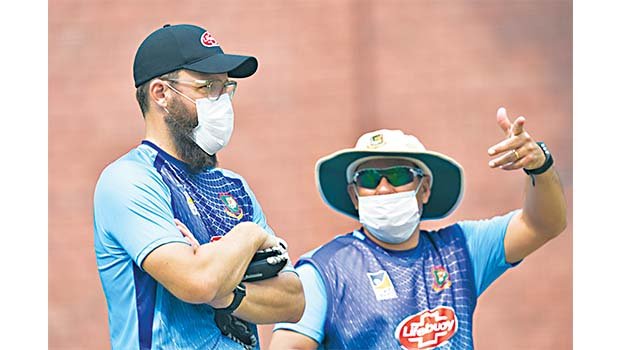Delhi’s air pollution worsens ahead of Ind-Ban T20I


The air quality in Delhi has plummeted to hazardous levels, and led to a public-health emergency. Schools have been shut, construction work stalled, and athletic activity advised against, but the two teams trained out in the middle and continued to shrug off the threat of playing in such poor air quality.
Delhi has officially declared a "public health emergency" over its air pollution. Technically, this means when levels of PM 2.5, microscopic, lethal, toxic particles, rise and stay above 300 micrograms per cubic meter. But in a major move, authorities thankfully cut the red-tape and closed schools for four days. According to GRAP, the Graded Action Response Plan, they should have first waited for 48 hours of PM 2.5 above the 300 level and then considered shutting schools.
However, as anyone who's breathed Delhi's air in the last couple of weeks knows it's been terrible thanks to their internal monitors - itchy eyes, runny nose, headaches, perhaps even asthmatic attacks in some cases. And this holds true for outside Delhi's borders too for a radius of over a hundred kilometres, NDTV reports.
This match is the first international fixture in India after Diwali, which raises severe questions over BCCI's planning because it is well documented that the weeks immediately after Diwali are some of the most hazardous on public health. The BCCI has had first-hand experience with Ranji Trophy matches cancelled and a Test match interrupted in the past.
The schedule was announced as early as June 2019. Match allocation in the BCCI works on rotation basis, but exchanging matches is not unheard of. However, the current BCCI office bearers took charge only last week, until when the board had been under the charge of the Supreme Court-appointed Committee of Administrators, who had been entrusted with ensuring the implementation of the Lodha Committee's reforms and overseeing the running of the board while that happened. So direct responsibility for this scheduling is hard to pin down.
Questions asked of CEO Rahul Johri, who was the chief executive even when the current BCCI was not in charge, went unanswered. New secretary Jay Shah didn't respond either, but new president Sourav Ganguly said on Thursday that it was not possible to change the venue at such a short notice.
The two camps, who are at possibly the biggest risk because they are undertaking strenuous athletic activity, tried to play the issue down. While the Bangladesh players privately complained of burning eyes, sore throats and their struggle to sleep, their coach Russell Domingo said they were not going to moan about it. In what might come across as an insensitive statement, he even said it is not like anybody has died on the field.
“It’s not something you’d want, but there is nothing you can do about it,” Domingo said. “It is what it is. We have to make sure that we prepare as well as possible and deal with it as well as possible. Thus far, for sure have some scratchy eyes and some sore throat now and then, but it’s been okay. Nobody's been sick or dying or anything like that. We've been okay with it.”
India’s batting coach Vikram Rathour compared it with playing in extreme weather conditions. Rathour himself played a lot of cricket in north Indian winters, so he was asked how much worse the pollution has become over time. “I don't think you even notice it,” Rathour said. “Playing cricket, you play sometimes in very hot weather… 45-46 degrees [Celsius]. Sometimes you play in extreme cold. Once you are in a game, I don't think you notice these things. It’s when you are sitting out”
More News: Bangladesh seek breathing space in Delhi
When told of the emergency conditions and the public-health advisory against athletic activity, Rathour said: “I understand that but we are here to play a game and can’t really do much about it. We are here to play and we will play.”
That's what the local hosting body, the Delhi and Districts Cricket Association (DDCA) said too. “As you must be aware that BCCI has said that it's too late to change the venue at the last moment,” Rajat Sharma, the DDCA president, told ESPNcricinfo.
"DDCA was advised to wash the trees inside the stadium so that the dust doesn't flow. DDCA was also asked to survey the area of about two kilometres around the stadium and if any polluting items such as construction material, burning garbage etc. is found it is to be reported to CPCB. They will ensure immediate action."
Read About Australian Cricket News
With the AQI (air quality index) reaching 471 on the afternoon two days before the match, these measures are not likely to make any significant impact on the air quality.


